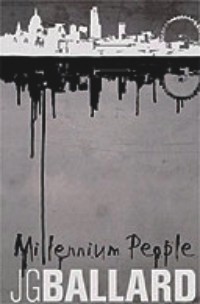|
Book Review
Having fun with the bourgeoisie
Revisiting old haunts
with added zest, JG
Ballard's Millennium
People captivates
TOBY LITT
Although JG Ballard's is the only name on the spine of Millennium People, this, his 16th novel, reads very much like collaboration. One of the co-writers is unmistakeably Ballard: "We set off for Hammersmith ... Gould lay back, gazing at the single-storey factories, the offices of video-duplicating firms and the lighting arrays of unknown stadiums. This was his real terrain, a zone without past or future, civic duties or responsibilities, its empty car parks roamed by off-duty air hostesses and betting-shop managers, a realm that never remembered itself."
Ballard's first novel, The Drowned World, was published just over 40 years ago; even then the peculiar rhythm of his sentences was already set. They swing back and forth, from clause to clause, in a regular and dignified way, between action and metaphor. Often, however, the metaphor is where the real action is taking place. By the time he came to write his novels of the 70s, Crash, Concrete Island and High-Rise, Ballard had settled in to his own "real terrain", a dreamy, slow-motion London of motorways, airports, hospitals -- all transit zones of one sort or another. It was as distinctive a fictional territory as Graham Greene's Greeneland.

Millennium People by JG Ballard 304pp, Flamingo, £16.99 |
So distinctive, in fact, that when he returns to it in Millennium People, the reader feels a sense of familiarity bordering on cosiness. But another writer seems to be accompanying him on this journey to the past - a far more conventional author. Ballard has often been content to let his novels exist in a mesmeric stasis, where obsessive compulsiveness stood in for character development and routines were more likely than revelations. The conventional writer, however, doesn't feel secure without all the benefits of a conventional plot. And so the action of Millennium People begins with David Markham's ex-wife, Laura, being killed by a bomb at Heathrow airport. Markham, who narrates the book, begins his own private investigation. Who planted the bomb? Why?
All of this could easily happen in a conventional crime novel or TV drama; and yet, this being Ballard, the advancing plot has already been undermined. On the first page there is a synopsis of almost all the rest of the novel: "Even I, David Markham, a trained psychologist infiltrated into Chelsea Marina as a police spy -- a deception I was the last to discover -- failed to see what was going on. But I was distracted by my unusual friendship with Richard Gould, the hard-working paediatrician who was the leader of the revolt - the Doctor Moreau of the Chelsea set, as our shared lover, Kay Churchill, christened him." This is a fast-forward parody of Ballard's usual schema. And it is the over-the-top self-parodic elements of Millennium People that provide some of its greatest pleasures.
Ballard has often set his stories up as a dialogue of seeming opposites. In The Drowned World it was contemporary London submerged by Triassic period flora and fauna. In Crash it was the automotive and the autodestructive. In Millennium People, it is the not-so-petty bourgeoisie and the revolutionary proletariat. "This," as Markham puts it, "is Kropotkin with pink gins and wall-to-wall Axminster." The use of middle-class props for acts of civil disobedience is a running-joke throughout the novel. "Banners hung from dozens of balconies, sheets of best Egyptian cotton from Peter Jones, gladly sacrificed for the revolution." Luckily, it's a very good running-joke, and it culminates in a stand-off with the police at the Chelsea barricades.
As the novel progresses, an escalating series of terrorist acts takes place in which Markham is sometimes obliquely, sometimes directly involved: a video-shop is attacked, the NFT is torched, Tate Modern is bombed. The high-point is reached when a blonde female TV presenter who is "both famous and a complete non- entity" is executed on her doorstep. Again, there is a strange collaboration between the old Ballard, who in Crashinvolved Elizabeth Taylor in a fantasised car accident, and the conventional writer, who takes the real-life murder of Jill Dando and vaguely fictionalises it. The most important difference is that the conventional writer runs along after events whereas Ballard has seemed, often unnervingly, to have been predicting them.
If part of Ballard has become a conventional writer it's because the world has adopted the conventions that he so idiosyncratically established. Richard Gould proclaims the Ballardian manifesto: "People don't like themselves today ... We tolerate everything, but we know that liberal values are designed to make us passive ... We're deeply self-centred but can't cope with the idea of our finite selves. We believe in progress and the power of reason, but are haunted by the darker sides of human nature. We're obsessed with sex, but fear the sexual imagination and have to be protected by huge taboos."
Toby Litt's novel Finding Myself is published by Hamish Hamilton. This article was first published in the Guardian.
Copyright
(R) thedailystar.net 2005 |
